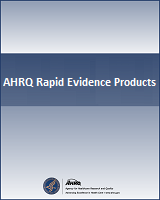NCBI Bookshelf. A service of the National Library of Medicine, National Institutes of Health.
Mackey K, Arkhipova-Jenkins I, Armstrong C, et al. Antibody Response Following SARS-CoV-2 Infection and Implications for Immunity: A Rapid Living Review [Internet]. Rockville (MD): Agency for Healthcare Research and Quality (US); 2021 Mar 15.
This publication is provided for historical reference only and the information may be out of date.

Antibody Response Following SARS-CoV-2 Infection and Implications for Immunity: A Rapid Living Review [Internet].
Show detailsAs Severe Acute Respiratory Syndrome Coronavirus 2 (SARS-CoV-2) antibody tests become widely available, clinicians and patients have questions about their interpretation and clinical use. Who should receive an antibody test and when is this testing clinically indicated? Does antibody testing provide information about reinfection risk among individuals who have recovered from COVID-19 (the disease caused by SARS-CoV-2)? For patients with detectable antibodies, should testing be repeated periodically to monitor the durability of their antibody response?
For clinicians to properly use and interpret SARS-CoV-2 serologic tests, up-to-date guidance is needed. Understanding how to interpret antibody testing and whether past infection protects against future infection is also necessary to develop successful public health interventions to reduce disease spread. Interpreting positive antibody test results as indicative of immunity (i.e., protection from reinfection or disease), without understanding the degree of protection conferred by antibodies, could be harmful if positive antibody results lead individuals to stop recommended practices such as wearing masks and social distancing. Guidelines from the Centers for Disease Control and Prevention (CDC)1 and the Infectious Diseases Society of America (IDSA)2 do not currently recommend antibody testing to help guide individual healthcare decisions; rather, antibody testing is only recommended for community seroprevalence surveys and in select cases to confirm SARS-CoV-2 infection.
While antibody presence is popularly equated with immunity, the actual relationship between antibodies and immunity varies among viral diseases. Reinfection frequently occurs with human coronaviruses that cause the common cold (hCoV-229N, hCoV-NL63, and hCoV-OC43), even though infection with these coronaviruses generates a host antibody response. For these coronaviruses, reinfection risk may be related to insufficient quantity or persistence of antibodies, insufficient antibodies at the site of infection, or frequent viral mutations that render host antibodies ineffective (similar to seasonal influenza).3,4 Because SARS-CoV has not reemerged since 2004, and MERS-CoV cases remain sporadic, experience from these two prior coronavirus outbreaks provides minimal insight into the reinfection risk with SARS-CoV-2.
Documented cases of SARS-CoV-2 reinfection have been relatively rare compared with the overall number of new COVID-19 cases worldwide.5 Case reports have generated speculation regarding the role of antibodies in the risk and severity of reinfection but have not demonstrated clear trends. While case reports and small case series are helpful to generate hypotheses regarding reinfection risk in SARS-CoV-2, larger studies that follow patients over time are needed to provide estimates of reinfection risk. For example, longitudinal studies of recovered COVID-19 patients or large prospective electronic health record database studies of infection rates among patients with and without prior COVID-19 and with and without antibodies could improve understanding of whether antibodies confer protective immunity.
The aims of this rapid systematic review are to synthesize evidence on the prevalence, levels, and durability of the antibody response to SARS-CoV-2 infection among adults and how antibodies correlate with protective immunity. Given the rapidly evolving evidence within this field, the Agency for Healthcare Research and Quality’s Evidence-based Practice Center (AHRQ EPC) Program will maintain this report as a living review with planned ongoing literature surveillance and critical appraisal. We will provide regular report updates as additional evidence becomes available, modifying the scope of the review as new directions in SARS-CoV-2 immunity research emerge. This review was conducted in coordination with the American College of Physicians (ACP) as part of AHRQ’s standing work to provide health professional organizations and systems with evidence reviews to support the development of clinical guidance for their clinician members.
- Background and Purpose - Antibody Response Following SARS-CoV-2 Infection and Im...Background and Purpose - Antibody Response Following SARS-CoV-2 Infection and Implications for Immunity: A Rapid Living Review
Your browsing activity is empty.
Activity recording is turned off.
See more...
